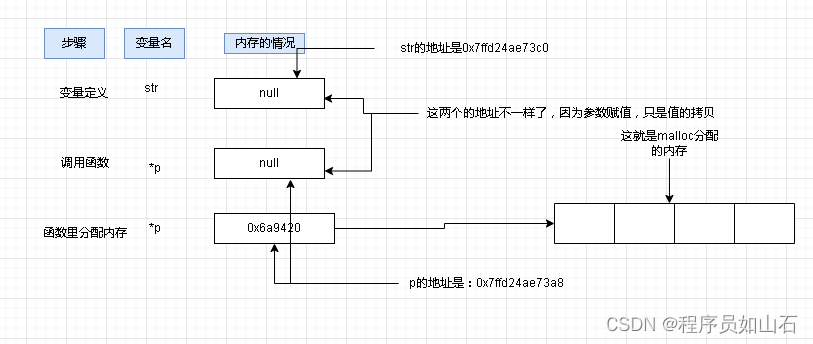1、情况
c语言指针的指针,还是比较常用的一个功能;当然,我也相信,一些用C语言很长时间的人,也没大用过,因为用不到,这是工作需求决定的,但总体来说,还是经常用的。
理解了指针的指针,我感觉才是真正理解了指针的含义
2、定义
指向指针的指针是一种多级间接寻址的形式,或者说是一个指针链。通常,一个指针包含一个变量的地址。当我们定义一个指向指针的指针时,第一个指针包含了第二个指针的地址,第二个指针指向包含实际值的位置。
C 中指向指针的指针
一个指向指针的指针变量必须如下声明,即在变量名前放置两个星号。例如,下面声明了一个指向 int 类型指针的指针:
int **var;
3、失败的实例
1 #include <stdio.h>
2 #include <string.h>
3 #include <memory.h>
4 #include <stdlib.h>
5
6 void getMemory(char *p, int num)
7 {
8 printf("enter function getMemory\r\n");
9 printf("p=%p,&p=%p\r\n", p, &p);
10 p = (char *)malloc(sizeof(char) * num);
11 printf("p=%p,&p=%p\r\n", p, &p);
12 printf("exit function getMemory\r\n");
13 }
14
15 int main()
16 {
17 char *str = NULL;
18 printf("str=%p,&str=%p\r\n", str, &str);
19 getMemory(str, 100);
20 strcpy(str, "hello");
21 printf("str=%s\r\n", str);
22 printf("str=%p\r\n", str);
23 printf("&str=%p\r\n", &str);
24 free(str);
25
26 }
~
~
"test2.c" 26L, 538C 已写入
root@mkx:~/learn/getMemory# ./test2
str=(nil),&str=0x7ffd24ae73c0
enter function getMemory
p=(nil),&p=0x7ffd24ae73a8
p=0x6a9420,&p=0x7ffd24ae73a8
exit function getMemory
段错误 (核心已转储)
root@mkx:~/learn/getMemory#
4、成功的实例
1 #include <stdio.h>
2 #include <string.h>
3 #include <memory.h>
4 #include <stdlib.h>
5
6 void getMemory(char **p, int num)
7 {
8 printf("enter function getMemory\r\n");
9 printf("p=%p,*p=%p\r\n", p, *p);
10 *p = (char *)malloc(sizeof(char) * num);
11 printf("p=%p,*p=%p\r\n", p, *p);
12 printf("exit function getMemory\r\n");
13 }
14
15 int main()
16 {
17 char *str = NULL;
18 printf("str=%p, &str=%p\r\n", str, &str);
19 getMemory(&str, 100);
20 strcpy(str, "hello");
21 printf("str=%s\r\n", str);
22 printf("str=%p\r\n", str);
23 printf("&str=%p\r\n", &str);
24 free(str);
25
26 }
~
~
"test1.c" 26L, 542C
root@mkx:~/learn/getMemory# gcc test1.c -o test1
root@mkx:~/learn/getMemory# ./test1
str=(nil), &str=0x7ffeddf9e010
enter function getMemory
p=0x7ffeddf9e010,*p=(nil)
p=0x7ffeddf9e010,*p=0xf22420
exit function getMemory
str=hello
str=0xf22420
&str=0x7ffeddf9e010
5、最后的总结
失败的例子的情况是这样的:

失败就是失败在,传给函数参数的变量p,与当前变量str的地址已经不一样了,它们只是存储的内容是一样的,这就决定了两边的操作,已经没有任何关系了,后来,又给没有分配内存的变量赋值,程序肯定崩溃了
成功的例子情况是这样的:

这里的成功之处,就在于用了指针的指针,一想,感觉有些糊涂的感觉,细想一下,其根本之处在于通过第二级指针,准确的定位到了一级指针,给一级指针赋值了分配内存的地址,就是这么简单。